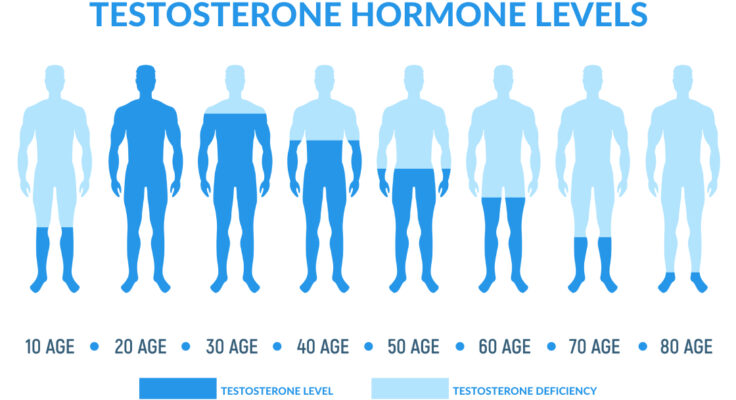Male Hormone Imbalance Therapy In San Diego
Considering male hormones, testosterone levels are an important factor to consider. This hormone largely impacts how a man feels and his level of motivation, as well as his risk for conditions like heart disease or diabetes. Generally, testosterone levels reduce by around 0.3-1.5% per year after the age of 30.

Studies suggest that men’s testosterone levels are considerably lower than they used to be, even when correcting for aging, with nearly 40% of men aged 45 or above suffering from low testosterone (which may be an underestimation).
Decreasing testosterone levels have numerous causes, including lifestyle choices, diet, environmental factors, and body weight. In this article, we’ll explore the role of testosterone, its symptoms when levels are low, potential causes for low levels, testing methods to identify it, and how to optimize testosterone.
What does testosterone do?
Testosterone, which is produced in the testes, plays a fundamental role in male physical characteristics such as voice deepening during puberty, muscle strength and size, and libido.

Furthermore, sufficient levels of this hormone are essential for both physical health (e.g. muscular size and performance at the gym) and mental health, since it helps regulate mood, motivation, cognitive function, and decision-making abilities.
Adequate levels of testosterone can help protect against a variety of health conditions, such as cardiovascular disease, atherosclerosis, diabetes, and cognitive decline.
A study that tracked 800 men over 50 years old for 18 years found that those in the lowest third of testosterone levels had a 33% higher rate of death from all causes than those in the highest third.
Testosterone plays many critical roles in the body, including:
- Cardiovascular health
- Reproductive health
- Cognitive and brain health
- Immune system health
- Energy metabolism
- Bone support
What are symptoms of low testosterone?
Symptoms of low testosterone can include:
- Low libido
- Difficulty achieving and maintaining an erection
- Cognitive decline
- Fatigue
- Decreased muscle mass
- Decreased ability to gain muscle despite working out
- Increased body fat or weight gain
- Decreased motivation
- Decreased bone density
- Infertility

Causes of low testosterone
Low testosterone can be the result of a variety of causes, such as primary hypogonadism (testicular disorder) and secondary hypogonadism (disorder at the pituitary hypothalamic level). Additionally, certain nutrition and lifestyle habits can also lead to decreased testosterone levels in men.
Causes of low testosterone can include:
- Obesity or overweight
- Insufficient exercise
- Toxin exposure
- Chronic stress
- Excessive sugar intake
- Chronic sleep deprivation
- Low vitamin D levels
- Poor gut health
- Prescription drugs (like statins or opiates)
- Trauma to the testes
- Sleep apnea
- Prolactinoma
Testing for male testosterone levels
There are a variety of options for measuring hormones, including blood, urine, and saliva. Each option has its own advantages and disadvantages. Serum blood tests are widely seen as the gold standard in assessing male hormone levels, and will be discussed in more detail below:

- Total testosterone – the reference range is from 300-1000 ng/dL, however most men feel optimally at the higher part of the reference range between 700-1000 ng/dL. However, total testosterone does not take into account how much testosterone is free vs bound.
- Free testosterone – an important marker to measure the testosterone that is unbound and freely available for use.
- LH (luteinizing hormone) – this is the signal from the brain to the testes to manufacture testosterone
- FSH (follicle stimulating hormone) – this is the signal from the brain to the testes to manufacture sperm
- SHBG (sex hormone binding globulin) – this is a protein that binds testosterone and shuttles it around the body. If SHBG levels are elevated, this means that not enough testosterone is freely available to the body.
- Albumin – this is a protein that also binds to testosterone and shuttles it around the body. Albumin binds to testosterone less tightly than SHBG.
- Estradiol – this is a measure of estrogen in the body. Testosterone can be turned into estrogen through what’s called aromatization. This can happen with chronic stress or weight gain. Estrogen is important and needs to be kept in balance (not too high, and also not too low).

Naturopathic approaches to low testosterone
Naturopathic doctors are well-equipped to provide strategies for maintaining healthy testosterone levels in men. Creating a customized treatment plan tailored to an individual’s medical history and laboratory tests is the best way to ensure optimal testosterone levels.

The following are some basic strategies to address when optimizing testosterone levels in men:
- Staying active and working out with weights
- Minimizing exposure to heavy metals, toxins, and chemicals
- Ensuring adequate Vitamin D levels, which have a large impact on testosterone levels (many men are deficient)
- Consuming a healthy diet that incorporates all major food groups like high quality fats, proteins, and carbohydrates.
- Avoiding excessive alcohol intake and smoking cigarettes
- 7-8 hours of quality sleep per night for most men
- Stress reduction through mindfulness, yoga, diaphragmatic breathing, meditation, tai chi or other practices.
- Testosterone replacement therapy – when indicated
TRT – Testosterone Replacement Therapy
Natural methods for boosting testosterone levels can be highly effective for many men. In other cases, testosterone replacement therapy may be the best option and can have a major impact on some men’s lives.
TRT is administered via intramuscular injections or topical creams. To ensure proper doses and good health while on TRT, it is important to monitor blood work regularly.
Testosterone replacement therapy can reduce the signal from the brain to the testes, potentially impacting fertility. Fortunately, medications such as clomid or HCG may be taken while undergoing TRT to preserve fertility in men.
